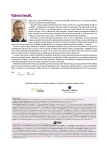Non-hormonal therapy of climacteric syndrome
Authors:
Tomáš Fait
Authors‘ workplace:
Gynekologicko-porodnická klinika 1. LF UK a VFN v Praze
Published in:
Prakt Gyn 2015; 19(2): 123-126
Category:
Climacteric medicine: Review article
Overview
Besides hormone replacement therapy we can use nonhormonal therapy for acute climacteric syndrome. The nonhormonal farmacotherapy is based on fytoestrogens. The influence of fytoestrogens on long term changes from estrogen deficinency has not been confirmed. On opossite side the effect on acute climacteric syndrome is clear. Short overview of possible nonhormonal solution is given with focus on fytoestrogenes.
Key words:
estrogen deficiency – climacteric syndrome – fytoestrogenes – nonhormonal therapy
Sources
1. Taku K, Melby MK, Kronenberg F et al. Extracted or synthesized soybean isoflavones reduce menopausal hot flash frequency and severity: systematic review and meta-analysis of randomized controlled trials. Menopause 2012; 19(7): 776–790.
2. Nappi RE, Malavasi B, Brundu B. Efficacy of Cimicifuga racemosa on climacteric complaints: a randomized study versus low-dose transdermal estradiol. Gynecol Endocrinol 2005; 20(1): 30–35.
3. Bai W, Henneicke-von Zepelin HH, Wang S et al. Efficacy and tolerability of a medicinal product containing an isopropanolic black cohosh extract in Chinese women with menopausal symptoms: a randomized, double blind, parallel-controlled study versus tibolone. Maturitas 2007; 58(1): 31–41.
4. Seidlova-Wuttke D, Hesse O, Jarry H et al. Evidence for selective estrogen receptor modulator activity in a black cohosh (Cimicifuga racemosa) extract: comparison with estradiol-17beta. Eur J Endocrinol 2003; 149(4): 351–362.
5. Qiu SX, Dan C, Ding LS et al. A triterpene glycoside from black cohosh that inhibits osteoclastogenesis by modulating RANKL and TNFalpha signaling pathways. Chem Biol 2007; 14(7): 860–869.
6. Powell SL, Gödecke T, Nikolic D et al. In Vitro Serotonergic Activity of Black Cohosh and Identification of Nω-Methylserotonin as a Potential Active Constituent. J Agric Food Chem 2008; 56(24): 11718–11726.
7. Kennelly EJ, Baggett S, Nuntanakorn P et al. Analysis of thirteen populations of black cohosh for formononetin. Phytomedicine 2002; 9(5): 461–467.
8. Burdette JE, Jianghua Liu J, Chen S et al. Black Cohosh Acts as a Mixed Competitive Ligand and Partial Agonist of the Serotonin Receptor. J Agric Food Chem 2003, 51 (19): 5661–5670.
9. Liggins J, Bluck LJ, Runswick S et al. Daidzein and genistein content of fruits and nuts. J Nutr Biochem 2000; 11(6):326–331.
10. Albert A, Altabre C, Baró F et al. Efficacy and safety of a phytoestrogen preparation derived from Glycine max (L.) Merr in climacteric symptomatology: a multicentric, open, prospective and non-randomized trial. Phytomedicine 2002; 9(2): 85–92.
11. Atkinson C, Newton KM, Bowless EJ et al. Demographic, anthropometric, and lifestyle factors and dietary intakes in relation to daidzein-metabolizing phenotypes among premenopausal women in USA. Am J Clin Nutr 2008; 87(3): 679–687.
12. Fait T, Donát J, Jeníček J et al. Doporučení pro hormonální substituční terapii v postmenopauze. Čes Gynek 2010; 75(2): 109–110.
13. Nikader E, Rutanen EM, Nieminen P et al. Lack of effect of isoflavonoids on the vagina and endometrium in postmenopausal women. Fertil Steril 2005; 83(1): 137–142.
14. Raimondi S, Roncaglia L, De Lucia M et al. Bioconversion of soy isoflavones daidzin and daidzein by Bifidobacterium strains. Appl Microbiol Biotechnol 2009; 81(5): 943–950.
15. Reeds SD, Newton KM, LaCroix AZ et al. Vaginal, endometrial and reproductive hormone findings: HALT study. Menopause 2008; 15(1): 51–58.
16. Unfer V, Casini ML, Costabile Let al. Endometrial effects of long-term treatment with phytoestrogens: a randomized, double blind, placebo-controlled study. Fertil Steril 2004; 82(1): 145–148.
17. Yuan JP, Wang JH, Liu X. Metabolism of dietary soy isoflavones to equol by human intestinal microflora. Mol Nutr Food Res 2007; 51(7): 765–781.
Labels
Paediatric gynaecology Gynaecology and obstetrics Reproduction medicineArticle was published in
Practical Gynecology

2015 Issue 2
-
All articles in this issue
- Editorial
-
Where is assisted reproductive technology heading?
Interview with professor P. Ventruba - Talks with Laura. This time with O. Šottner, MD
- Analysis of the set of primiparous women with induced labor
- The importance of calcium intake during pregnancy and lactation and the possibilities of its supplementation
- Possible treatment of anogenital warts with the immunomodulation agent Isoprinosine
- Perforated appendicitis in pregnancy: case report
- Has the pregnancy outcome of women with pregestational diabetes mellitus improved in ten years?
- Methods of screening for the most common congenital structural and chromosomal fetal defects
- Non-hormonal therapy of climacteric syndrome
- Post menopausal osteoporosis – „dysmobility syndrome“
- Behaviour and psychosocial needs of newborn
- Spontaneous birth after Caesarean section – importance of sonographic evaluation of the lower uterine segment
- Midwife in London
- Kateřina Štechová a kol. Dítě diabetické matky. Komplexní pohled na diabetes a těhotenství
- Practical Gynecology
- Journal archive
- Current issue
- About the journal
Most read in this issue
- Possible treatment of anogenital warts with the immunomodulation agent Isoprinosine
- Spontaneous birth after Caesarean section – importance of sonographic evaluation of the lower uterine segment
- Behaviour and psychosocial needs of newborn
- Methods of screening for the most common congenital structural and chromosomal fetal defects
